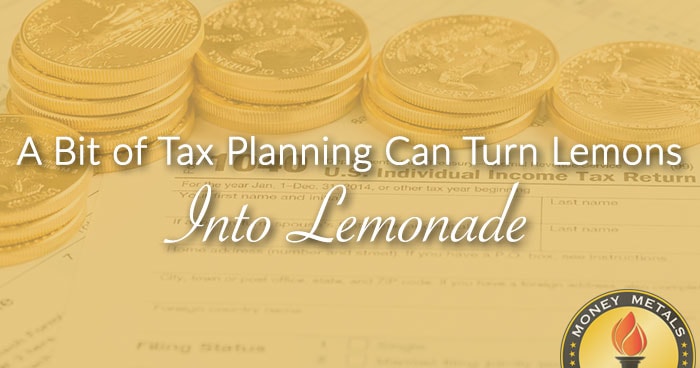The IRS classifies bullion coins and bars that carry zero collectible value the same way it categorizes a collection of baseball cards. Because of the IRS’s dishonest interpretation of tax law, gold, and silver bullion is currently subject to the higher 28% long-term capital gains rate for “collectibles.” By comparison, the rate for Wall Street and government-approved assets – just about everything else – is 15-20%, depending upon the taxpayer’s income.
Investors might as well use this punitive long-term capital gains rate to their advantage. Metal purchased more than a year ago at a higher price can be sold to unlock losses and reduce taxes. Individuals can claim up to $3,000 in losses against ordinary income, and more if they have capital gains on another asset. (Check with your tax advisor.)

Now is certainly not a great time to exit the metals markets, in our opinion. Fortunately, realizing capital losses can be done without relinquishing a position in metals for more than a few seconds. Investors can immediately buy replacement metals without having the transaction classified as a wash sale (wash sale rules do NOT apply to precious metals – only to securities).
Taking losses now does lower the investor’s cost basis going forward. The new basis becomes the price at which replacement metals are purchased. That could mean larger taxable capital gains down the road if they are sold at a profit. There are a couple of ways to address this...
The first is to transfer the metals to heirs as part of an estate. For investors with no plans to sell metals going forward, the gains may never be taxed. Profits which go unrealized before the owner dies are not subject to the IRS rake, provided the total value of the estate is below the cap. Currently, estates worth $5.49 million per individual or $10.98 million for a married couple will transfer to heirs tax-free.
Heirs receive the bullion without liability and the cost basis is adjusted to whatever the value of the metal happens to be upon inheritance. Taxes will only be due on gains from that moment forward – and only when they are finally sold by the inheritor.
Likewise, any capital losses on metals will not be transferred to heirs. So it is good tax planning to realize any losses before the metals wind up in an estate.
The other way to address higher capital gains taxes associated with precious metals is to hold them inside a self-directed IRA. Metals investments held that way appreciate tax-deferred.
One very effective tax strategy for those who have losses they can unlock is to sell metals they hold personally and use the proceeds to either start a self-directed precious metals IRA or contribute to an existing one. The investor gets to claim the losses AND take advantage of the deduction for contributions to a retirement plan on this year’s tax return.
It is worth noting that the tax treatment of your non-retirement metals is the same regardless of whether you own the metal in physical form or as shares in one of the big gold and silver exchange-traded funds (ETFs). These funds are organized as trusts and they get taxed as if the assets they hold – precious metals bars – were held directly by the ETF’s shareholders.
That makes now a great time for investors to dump any paper gold and silver they may hold as ETF, and upgrade to physical bullion which offers zero-counter party risk.
If storing physical metals is a concern, Money Metals Depository can handle that for you starting for as little as $96 per year. MMD’s storage rates for segregated storage are the absolute lowest available in the industry.
For less than one might pay in ETF management fees, investors can place their metals into fully segregated storage in our new high-security vault. Bullion that you purchase from Money Metals Exchange will be delivered to your storage account without the cost or delay associated with shipping.
Metals investors would rather be talking about higher prices and profits to be sure. But there are ways to turn the lemons the markets have handed out in recent years into lemonade.

About the Author:
Clint Siegner is a Director at Money Metals Exchange, a precious metals dealer recently named "Best in the USA" by an independent global ratings group. A graduate of Linfield College in Oregon, Siegner puts his experience in business management along with his passion for personal liberty, limited government, and honest money into the development of Money Metals' brand and reach. This includes writing extensively on the bullion markets and their intersection with policy and world affairs.






